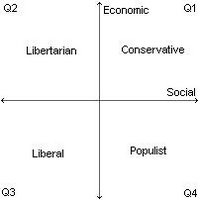Temporary LOA
-Raphael Hythloday
-Raphael Hythloday
It has always been important to me that I drive out any inconsistencies and hypocrisies in my political views. For example, I hate cigarettes and I think that they should be considered at least on par with other drugs that are illegal and yet do not cause nearly as much damage to your health.
The issue arose of a certain ballot proposition we will be voting on in California in November where, in order to finance hospital expansion of some sort, we were going to raise the tax on tobacco products by a large amount.
At first, although I knew the destination of the money was simply to illegal immigrant pockets, I supported the initiative because I knew from economics 101 that if you tax a good, consumption will decrease. Which I considered to be a positive.
However later on, the socialist Democrats in the California Legislature were trying to push an excise tax on the purchase of SUVs and Mini-Vans of $2,000 which would then be turned around and given as a subsidy to the purchase of “clean-air” vehicles. This bill seemed abhorrent to me on its own, but when coupled with my pleasure at taxing tobacco consumption into the ground I realized that there was hypocrisy in my political views.
The essential question came down to whether or not it was acceptable for society to place a tax on a good simply because we do not like it. The answer I came to was a resounding no. I no longer support the cigarette tax proposition (Proposition 86 I believe). I feel that if society deems something as inappropriate, whether it be tobacco, alcohol or SUVs, it should outlaw it, not tax it.
It was in the process of thinking through this issue that I began to ponder on ideologies and what drives them. I came up with three ‘levels’ that I wish to share with you. Bear with me because I use terms that have a colloquial definition with which I disagree.
The first level is a summary of your views and stances on the issues, the second is what I call your “underlying philosophy,” and the third is your position with respect to the mainstream population of today.

The first level is above all irrespective of your political party. If you would please envision a coordinate plane in which the y-axis is ‘economic issues’ and the x-axis is ‘social issues.’ Using these measures, you can be placed in a quadrant. Because “right-wing” lies to the right, I am labeling it as both positive x and positive y. Therefore, Quadrant 1 becomes ‘conservative,’ Quadrant 2 becomes ‘libertarian,’ Quadrant 3 becomes ‘liberal,’ and Quadrant 4 becomes ‘populist.’
It is important to remember that these words may not have the exact definitions with which you are familiar. The colloquial definitions for ‘liberal’ and ‘conservative’ in particular are defined slightly differently.
Whereas the first level dealt with your particular answer to the question of “what” you believe, the second level deals with “why” you believe a certain way. I refer to these designations as “under-lying philosophies,” and they provide an over-arching reasoning behind most of your views on the issues.
For example, “Christianity” could be an underlying philosophy that would give an answer for many issues. Not every under-lying philosophy provides an answer to every issue however and so there could be secondary philosophies that fill in the gaps. Not everyone who subscribes to a particular underlying philosophy has to toe the party line exactly, everyone varies slightly.
The particular view you have on an issue can be reasoned out in many ways and it is there that you show which philosophy you are relying upon.
The final level is expressed in terms of ‘conservative’ and ‘progressive,’ referring to your position among the mainstream popular thought of the day. These terms are the only terms that change with time. A perfect example is that of the word ‘liberal,’ when it was used to refer to people who supported democratic government over autocratic rule. Royalists were termed ‘conservative’ and democratic thought was termed ‘liberal.’ The liberal used in this sense is better described as progressive in my system. Very few people today advocate the institution of a monarchy over a democracy in America and so everyone is progressive in terms of early 19th century thought.
However, in terms of today’s thinking the Republican Party can be considered conservative, while the Democratic Party is termed progressive. This here is where the party definitions tend to lie; alongside contemporary fluid definitions on the issues.
As a quick illustrative issue, let us look at abortion. At the first level, you are either pro-choice or pro-life, corresponding to the right or the left on the social axis, making you either conservative-populist or liberal-libertarian.
Now if you were asked “why are you pro-choice/life,” there are many answers you could give. “Human life is sacred,” “A woman’s right to choose,” and “It is beneficial to society as a whole to allow parents who are not ready and/or able to support children to not have to do so” are just three of the many answers given.
Each of these answers corresponds to an underlying philosophy of their own, with many philosophies even giving the same answer. For example, “A woman’s right to choose” and “…beneficial to society…” both bring themselves to pro-choice, but the latter could be considered a Social Darwinistic under-lying philosophy, whereas the former could be many things, of which feminist and civil libertarian are possibilities.
As you can see, there are infinite possibilities when it comes to under-lying philosophies. However, it is important to remember that everyone has one or many, whether they know it or not and that everyone bases their decisions on the way the philosophies show them how to look at the world.
-Raphael Hythloday
Recently a source revealed to me an interesting piece written by the President of the USC College Democrats. It shows that the end of the world may not necessarily be around the corner; it shows that there is some hope for the future of America; it shows that there is at least one “prominent” Democrat with some idea of what it means to be American.
Michael Stephan has shown us that there are still a few Democrats who truly believe that America is the greatest nation on Earth. The following poem was written by Mike and read aloud at his high school on the anniversary following 9/11. It is, in Mr. Stephan’s classic style, riotously funny. Its message and portent however are deadly serious.

A Poem about the Taliban by Michael J. Stephan
I do not like the Taliban.
I do not like it,
Uncle Sam, I am.
I do not like it, with a potAta,
I do not like it, with al Queda.
I do not like it with a man,
I would not, could not, in Afghanistan.
I will not like it in the rain,
I do not think, they have a brain.
I think their minds are made of wax,
I'm sick of all their an-tha-rax.
I do not
like the Taliban.
I do not like it,
Uncle Sam, I am.
I do not like it in a Mercedes-Benz,
I do not like it, they hurt all of my friends.
I do not like it, in a can,
I would not, could not, in a dirty, lethal, armored van.
I do not like it in a plane,
I think they all are insane.
I do not like them, hiding in a cave,
I will only like them in a grave.
I do not like the Taliban.
I do not like it,
Uncle Sam, I am.
I do not like it, they knock down our stuff,
I do not like it, they aren't so tough.
I do not like it, they like to lament,
I would not, could not, with no government.
I do not like it, the day is here,
I do not like it, now we know fear.
I do not like it, they had a grenade,
I do not like it, now they are afraid.
-The United States is truly the greatest nation on Earth.
Granted this show of patriotism was before the invasion of Iraq and is directed solely towards Afghanistan, not anywhere else. However, it has to be asked what happened to this fervor. Later in the year, after the invasion of Iraq, my sources tell me that Mr. Stephan led a school walkout protest of the war. Disregarding our party differences on the reasons and validity of going into Iraq, I want to ask Mr. Stephan where is the patriotism that he showed in his youth? Does he still claim that America is the greatest country on Earth? Democrats who can unequivocally make the statement that "The United States is truly the greatest nation on Earth" are very few and far between.
If, despite the general feeling of apathy Democrats have towards America’s greatness, Mr. Stephen is willing to publicly state his pride in America, then he deserves a round of applause. I would be more than happy to applaud him, but the question remains, will his fellow Democrats allow him to say it?
-Raphael Hythloday
It is an understatement to say that we face an educational crisis in America today. The intention of this article is not to go into the specifics of the dangerous “education gap” that exists between America and other competing countries across the globe. Instead, we are going to examine concrete solutions that will quickly and effectively solve problems.
In order to ensure that America remains scientifically and militarily superior to the developed and developing world we need to increase the emphasis that today’s primary and secondary educational institutions place on math and science. Additionally, it is important that America remain culturally vibrant and informed, where every member of society can make intelligent decisions at the ballot box.
There are three realms of discussion within education reform. First, there is the issue of private school vouchers. Second is the question of which level of government is responsible for which aspect of education. Finally, we have to determine the way to handle the diverse levels of potential and achievement that is found within our children. The latter two items are for another day; today we shall look at the wonderful world of vouchers.
Private school vouchers are a good idea. There is no logical argument against them, there is no downside to implementing them and they should no longer be in debate. In a system that includes vouchers, instead of the state (or whatever level of government) spending x numbers of dollars on a student in the public school system; a parent will instead receive a “voucher” which they can then present to an accredited institution who can redeem it for cash from the state. Before we get into the benefits, lets look at what people claim are the downsides.
Senator Hillary Clinton had nothing but praise for the voucher system. "First family that comes and says 'I want to send my daughter to St. Peter's Roman Catholic School' and you say 'Great, wonderful school, here's your voucher. Next parent that comes and says, 'I want to send my child to the school of the Church of the White Supremacist ...' The parent says, 'The way that I read Genesis, Cain was marked, therefore I believe in white supremacy. ... You gave it to a Catholic parent, you gave it to a Jewish parent, under the Constitution, you can't discriminate against me.' So what if the next parent comes and says, 'I want to send my child to the School of the Jihad? ... I won't stand for it."

The concept of a ‘School of the Jihad’ receiving government funding is laughable. It is a poor example and as a criminal organization would not be accredited, because accreditation is an important part of the voucher system.
As far as the ‘Church of the White Supremacist’ goes, while I admit that I have never been anywhere in the deep south but Florida, I have flown over much of it, and I do not think that there is an organization of any significance with that name. The likelihood of such a school coming into existence is nearly nothing, and even if it did, the likelihood that the community it is located in would stand for it is even less. If, despite this extreme unlikelihood, there did exist a school where ignorant racists can teach other ignorant racists about what it means to be ignorant then let them have each other, let them hire each other for all I care, because they won’t find any jobs outside of their fellow idiots. I would never hire one.
The only other people besides Senator "out-of-this-world" who oppose public school vouchers are the hack leaders of the teachers' union. Their reasoning: it would cause some teachers to lose their jobs. But wait! If anything, the voucher system would lead to a reduction in class sizes. Does that not mean that for a given number of students, you will need more teachers? So you mean the teachers' union really means that it will cause some of the teachers' union's members to take non-union jobs? Oh, that is horrible and cannot happen. But of course if the teacher’s union is doing such a damn good job, the private schools will just unionize themselves right? Right… The British have it right, their national teachers' union is simply called the "National Union of Teachers," and they abreviate it NUT right on their home page.
So now we see that I was right when I said that no one of significance, I mean intelligence, actually opposes a voucher system. A cardinal rule of public finance that everyone loves to ignore is that if it ain’t broke, don’t fix it. If a free market does something, why do we need government intervention? The Soviet Union proved that there is very little the government can do better than the private sector can; The Los Angeles Unified School Bureaucracy (LAUSB, they changed their name, didnt you hear?) proves that government cannot do education better either. In fact, if we implemented vouchers today, there would still be a system of public schools; however, those schools would have to clean out all of their unnecessary bureaucrats and administrators in order to compete on an adequate level with private schools. Where is the problem with this, it sounds perfect to me.
Implementing a voucher system is not only the most effective way to give our children a better education; it is the easiest and quickest system to implement and is something we can do today to immediately brighten the future for our youth and for our country.
-Raphael Hythloday
As we enter into the 2006 hurricane season, I wish to make a few quick observations. When I woke up this morning, the local news was on and the reporter was interviewing Southern Californians at LAX regarding how their travel plans were affected by Hurricane John.
I remember one of them in particular because he said, “you can’t change your plans just because you hear something.” This comment was in response to being told that there was a Category 3 Hurricane bearing down on the coastline he is planning to vacation on.

Now if you are wondering if there can really be people in this country that are that stupid, there is another hurricane that you should remember. I believe that in the spirit of the anniversary of Hurricane Katrina we should make an attempt to learn the mistakes of the past, and use hindsight to improve our foresight.
I will try and make this as clear as possible because I realize that the people who need to hear this are the least intelligent among us. If there is a hurricane, then get out of the way. The people who were involved in Hurricane Katrina failed in this respect. How many days warning did they have that the hurricane was nearing? How many days before landfall was there a mandatory evacuation order in effect?
Now let’s apply this simple if-then logic to Hurricane John. If there is a hurricane (TRUE), then get out of the way (Restatement: Do not get in the way).
There are many of us who are wondering why we should care about people who were stupid enough not to get out of the way of a hurricane that they had fair warning about. Having grown up in Southern California, I know that if I had the wonderful luxury of even having a single day’s warning about an earthquake, you can bet your Cajun cooking I would be out-of-state.
For a final take on Hurricane John let’s look at some of the actual effects this hurricane may have on the health of America. Firstly, any time we have the dullest tools in our national shed running to where they are sure to get killed (the ‘human shield’ of Iraq or tourists in Mexico during a hurricane) we stand, from a national gene pool point of view, to win.
Moving away from this point however, let us paint the scenario of Hurricane John causing as much death and destruction in Mexico as Hurricane Katrina caused in Louisiana. Simple supply and demand analysis of the labor market in Mexico tells us that with less workers (more dead) and more work to do (rebuilding) Mexico stands to see an increase in both the quantity of labor demanded and the price of that labor. Translation for us: more higher paying jobs in Mexico means less illegal immigrants crossing our borders. It’s a win-win for America.
-Raphael Hythloday